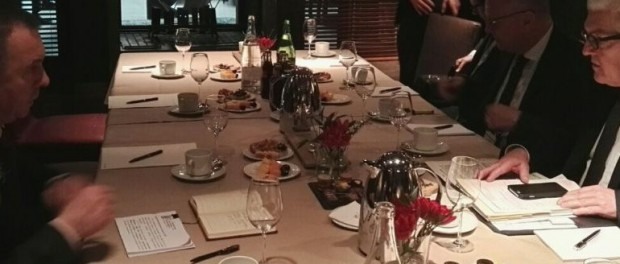Vishegrad pass for Lukashenko

The head of the Foreign Ministry of Belarus Vladimir Makey expressed hope that the relationships with the EU would improve in the nearest future with regard to suspending sanctions against Belarus.
‘The lifting of the majority of sanctions allows us to develop comprehensive cooperation with the EU. I think the near future will see certain steps towards improvement of the dialogue with our European partners,’ stated Makey. What the minister didn’t specify was the steps themselves. As noted by observers, by improving the relationships with the EU Makey primarily meant economic partnership and mutual foreign trade as an opportunity to diversify Belarusian exports.
According to some estimates the nameless ‘certain steps’ that Vladimir Makey has been talking about may be materialized in March by the visit of the head of the Belarusian Foreign Ministry to Budapest with a personal letter from Lukashenko.
One should note that it is going to be the first official visit of the head of the Belarusian Foreign Ministry to Europe after lifting the sanctions. Such letters usually state that its author is ready to develop relationships with no concealed subjects. Traditionally the subject that is still concealed from the media and Belarusians is the forthcoming Makey visit itself. This time it will be one of the countries of the Visegrad Group which tries to discuss in one voice the EU problems in Brussels. With specific focus on the current migrant crisis in Europe.
For some time now this issue has been raised several times in regard to European Belarus. For instance, some UN officials suggested that Belarus should share the burden of the migrant deluge that encumbers Europe. They emphasise the positive Belarusian experience of hosting Ukrainian refugees but totally ignore dramatic differences between the two cases, including cultural, linguistic and other differences among refugees themselves.
Lukashenko’s envoy in Budapest is sure to understand the arguments of the Hungarian diplomats relating to the migrant flood for Hungary has been in the focus recently due to the ongoing migrant crisis. In Brussels (and not only there), they claim that the Hungarian government treats the refugees inhumanely and that has harmed the county’s image. The European Commission is known to have started legal proceeding because of the new migration legislation introduced in Hungary in September 2015.
Certainly, what should be in the spotlight during the visit of Makey is his meeting with the Prime Minister Victor Orban who is particularly sharply critisised by European multiculturalists. No one questions the fact that the high-ranked guest from Minsk will meet not only his Hungarian colleague during the official visit. By the way, the full name of his colleague’s title is the Minister of Foreign Affairs and Trade of Hungary. Peter Siyyarto already happened to meet the head of the Belarusian Foreign Ministry during his prompt working visit to Minsk in April 2015 resulting in concluding that Budapest is committed to economic and trade matters in the development of the bilateral relationships. Obviously, during his first official visit to Hungary – the country playing an important role in the regional Visegrad Group – Makey will confidently elaborate upon this theme without delving into the basis of European values.
Apparently, Hungary will be the first, but not the last capital that will pave a kind of ‘Visegrad path’ to Europe for exempted-from-sanctions Lukashenko.
Such ideas of Minsk strategists can be observed in different formats, including so called Minsk expert platforms cultivated under the personal patronage of the Minister of Foreign Affairs of Belarus to say the least. He managed to get started from one of these platforms by attending the International Munich Conference where he had a conversation with the German Foreign Minister probably among other things about using Minsk as a platform for contacts of the opposing sides in Ukraine.
One cannot fully eliminate the possibility of Lukashenko visiting Berlin, that, as far as is known, he has never been to. Hardly anyone remembers that in the early days of his first presidential term Lukashenko visited Paris. No one has seen him on official or working visits in the EU capitals since. Now, as the sanctions have been lifted, Lukashenko may go wherever he wants. However, only if invited as a head of state.
Since Minsk strategists suffer from significant self-assurance of their foreign policy success, we should not question the existence of a schedule of Lukashenko’s visits to Europe. This was the subject of ostensibly ironic, but ambiguous thoughts of some visitors from Moscow who recently guested in Minsk Independence Palace. Admittedly, that ‘certain steps towards Europe’ of Makey’s appeared shortly afterwards.
Clearly, there is another Visegrad capital of particular interest in terms of creation such a path for Lukashenko – namely Warsaw. According to various media another Makey colleague is going to make an official visit to Minsk – the head of the Polish Ministry of Foreign Affairs. However, it turned out to be only the minister Witold Waszczykowski’s desire to come to Minsk by personal automobile and visit his mother’s birthplace so far. Notably, neither the first nor the second news about a possible visit was followed by any clear response from the official Minsk Government and its Foreign Ministry.
It seems that, unlike the banks of the Dunabe, everyone on both banks of the Bug is only cautiously keeping an eye on each other. This situation may be ensured to some extent by anticipated events concerning NATO on one bank and socio-economic issues on the other. Whether the paved by Makey ‘Visegrad path’ to Europe for Lukashenko will help to cope with the ongoing economic crisis is not clear. For now the optimism of Belarusian officials and businessmen is met by great pessimism from their European colleagues.



Leave a comment